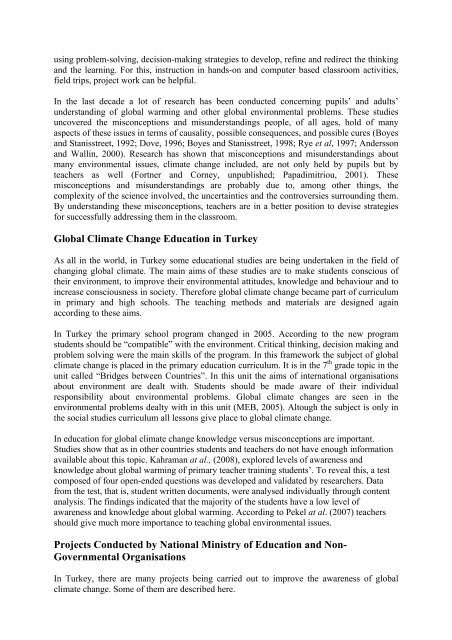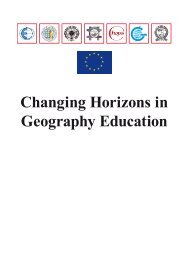Global Climate Change Education in Turkey Dr. Elif Aladag, Ass.Prof ...
Global Climate Change Education in Turkey Dr. Elif Aladag, Ass.Prof ...
Global Climate Change Education in Turkey Dr. Elif Aladag, Ass.Prof ...
You also want an ePaper? Increase the reach of your titles
YUMPU automatically turns print PDFs into web optimized ePapers that Google loves.
us<strong>in</strong>g problem-solv<strong>in</strong>g, decision-mak<strong>in</strong>g strategies to develop, ref<strong>in</strong>e and redirect the th<strong>in</strong>k<strong>in</strong>g<br />
and the learn<strong>in</strong>g. For this, <strong>in</strong>struction <strong>in</strong> hands-on and computer based classroom activities,<br />
field trips, project work can be helpful.<br />
In the last decade a lot of research has been conducted concern<strong>in</strong>g pupils’ and adults’<br />
understand<strong>in</strong>g of global warm<strong>in</strong>g and other global environmental problems. These studies<br />
uncovered the misconceptions and misunderstand<strong>in</strong>gs people, of all ages, hold of many<br />
aspects of these issues <strong>in</strong> terms of causality, possible consequences, and possible cures (Boyes<br />
and Stanisstreet, 1992; Dove, 1996; Boyes and Stanisstreet, 1998; Rye et al, 1997; Andersson<br />
and Wall<strong>in</strong>, 2000). Research has shown that misconceptions and misunderstand<strong>in</strong>gs about<br />
many environmental issues, climate change <strong>in</strong>cluded, are not only held by pupils but by<br />
teachers as well (Fortner and Corney, unpublished; Papadimitriou, 2001). These<br />
misconceptions and misunderstand<strong>in</strong>gs are probably due to, among other th<strong>in</strong>gs, the<br />
complexity of the science <strong>in</strong>volved, the uncerta<strong>in</strong>ties and the controversies surround<strong>in</strong>g them.<br />
By understand<strong>in</strong>g these misconceptions, teachers are <strong>in</strong> a better position to devise strategies<br />
for successfully address<strong>in</strong>g them <strong>in</strong> the classroom.<br />
<strong>Global</strong> <strong>Climate</strong> <strong>Change</strong> <strong>Education</strong> <strong>in</strong> <strong>Turkey</strong><br />
As all <strong>in</strong> the world, <strong>in</strong> <strong>Turkey</strong> some educational studies are be<strong>in</strong>g undertaken <strong>in</strong> the field of<br />
chang<strong>in</strong>g global climate. The ma<strong>in</strong> aims of these studies are to make students conscious of<br />
their environment, to improve their environmental attitudes, knowledge and behaviour and to<br />
<strong>in</strong>crease consciousness <strong>in</strong> society. Therefore global climate change became part of curriculum<br />
<strong>in</strong> primary and high schools. The teach<strong>in</strong>g methods and materials are designed aga<strong>in</strong><br />
accord<strong>in</strong>g to these aims.<br />
In <strong>Turkey</strong> the primary school program changed <strong>in</strong> 2005. Accord<strong>in</strong>g to the new program<br />
students should be “compatible” with the environment. Critical th<strong>in</strong>k<strong>in</strong>g, decision mak<strong>in</strong>g and<br />
problem solv<strong>in</strong>g were the ma<strong>in</strong> skills of the program. In this framework the subject of global<br />
climate change is placed <strong>in</strong> the primary education curriculum. It is <strong>in</strong> the 7 th grade topic <strong>in</strong> the<br />
unit called “Bridges between Countries”. In this unit the aims of <strong>in</strong>ternational organisations<br />
about environment are dealt with. Students should be made aware of their <strong>in</strong>dividual<br />
responsibility about environmental problems. <strong>Global</strong> climate changes are seen <strong>in</strong> the<br />
environmental problems dealty with <strong>in</strong> this unit (MEB, 2005). Altough the subject is only <strong>in</strong><br />
the social studies curriculum all lessons give place to global climate change.<br />
In education for global climate change knowledge versus misconceptions are important.<br />
Studies show that as <strong>in</strong> other countries students and teachers do not have enough <strong>in</strong>formation<br />
available about this topic. Kahraman at al., (2008), explored levels of awareness and<br />
knowledge about global warm<strong>in</strong>g of primary teacher tra<strong>in</strong><strong>in</strong>g students’. To reveal this, a test<br />
composed of four open-ended questions was developed and validated by researchers. Data<br />
from the test, that is, student written documents, were analysed <strong>in</strong>dividually through content<br />
analysis. The f<strong>in</strong>d<strong>in</strong>gs <strong>in</strong>dicated that the majority of the students have a low level of<br />
awareness and knowledge about global warm<strong>in</strong>g. Accord<strong>in</strong>g to Pekel at al. (2007) teachers<br />
should give much more importance to teach<strong>in</strong>g global environmental issues.<br />
Projects Conducted by National M<strong>in</strong>istry of <strong>Education</strong> and Non-<br />
Governmental Organisations<br />
In <strong>Turkey</strong>, there are many projects be<strong>in</strong>g carried out to improve the awareness of global<br />
climate change. Some of them are described here.
















